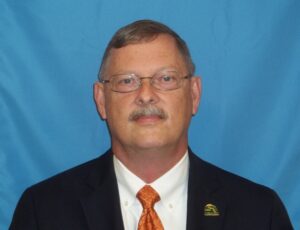 Briefly share your background.
Briefly share your background.
I am an ICMA Credentialed Manager with a bachelor’s degree from the University of Florida, a Master’s in Public Administration from Florida State, and 29 years experience in local governance. I have a unique non-linear career path that includes time in conflict zones with ICMA-International (Iraq) and the Department of State (Afghanistan) plus working as the chief appointed official in a Florida special district. I am currently the Indian Harbour Beach City Manager.
When did you join FCCMA and why?
I joined FCCMA in graduate school in 1997 because I wanted to work in local government and a professor told me that a small investment in an FCCMA student membership would reap long-term benefits. She was correct back in 1997, and I believe FCCMA is still the best investment an individual can make for their career in terms of value and continuing educational opportunities. For those of you who enjoy trivia, I was the 1997 B. Harold Farmer Scholarship recipient.
Why did you choose to work in local government?
My late father was a small-town police officer, and I grew up around people who worked in various front-line municipal jobs. Although many people mainly follow national politics, I enjoy being a part of a team that provides the daily services people depend upon and helping other local government professionals grow in their fields. While new buildings and infrastructure get the limelight, I take satisfaction in knowing there are people working in various agencies who I have played a part in their professional development and growth.
What did you learn from working with the military in Iraq and Afghanistan?
As a Senior Governance Advisor embedded in joint military-civilian municipal support teams, I realized that understanding people’s motivations (elected officials, subordinates, residents, vendors, etc.) was the key to accomplishing assigned tasks. Besides adopting military acronyms, date/time formats, and hair style, I learned the importance of all team members understanding the purpose of the mission, what to do when the unexpected occurs, and that there will always be grumbling. U.S. Army Col. Higgins told me one night at the DEFAC (dining facility, or as my late father’s Korea experience would have said, “chow hall”) that “no matter how well briefed the troops are, some will always grumble. Do not worry about the grumbling., Worry when they stop grumbling.” As a local government professional who always strove for maximum community engagement, this was an eye-opening statement, yet one that I believe is true.
How would you describe your management philosophy?
I am a combination of the many mentors I have served under in previous positions. Technically, the answer would be the “Swanson/Stanton/Bolin/Brobeil/Feldman/Lewis/Higgins” management style. My default approach is being a team-oriented, empowering consensus leader. However, in some situations I have had to back up to a more top-down approach to overcome resistance or obstacles. Long-term, however, I believe empowering my staff to make good decisions has longer-lasting positive impacts than making sure every decision is made how I would do it.





